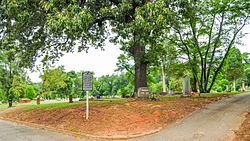Randolph Cemetery is a historic cemetery for African-Americans in Columbia, South Carolina. It was established in 1872 and expanded in 1899. It was named for Benjamin F. Randolph (1820–1868), who was reburied at the cemetery in 1871. Randolph was a militia leader protecting African Americans when he was assassinated. A memorial in his honor and for other African-American leaders killed was erected[when?].[2] Gravemarkers include both manufactured and vernacular homemade varieties. The cemetery holds eight Reconstruction Era state legislators.[3][4] It was added to the National Register of Historic Places in 1995.[1]
Randolph Cemetery | |
 | |
| Location | Western terminus of Elmwood Ave., Columbia, South Carolina |
|---|---|
| Coordinates | 34°0′34″N 81°3′15″W / 34.00944°N 81.05417°W |
| Area | 4 acres (1.6 ha) |
| Built | 1872, 1899 |
| NRHP reference No. | 94001573[1] |
| Added to NRHP | January 20, 1995 |
History
editRandolph Cemetery was established as the first cemetery for Columbia's African-American population (up until then, African-Americans has been buried in the local potter's field called Lower Cemetery between the river and the current Randolph Cemetery).[5] The cemetery initially consisted of three acres purchased from Elmwood Cemetery in 1872.[6] An additional acre was purchased in 1899.[3] Today it spans about six acres. But how those additional two acres were acquired is not clear.[7]
The cemetery fell into decline as the descendants of those interred and the owners of the remaining plots moved away, many as part of the Great Migration. The area became wilderness by the middle of the 20th century.
The city of Columbia began to clear it out with bulldozers as part of its urban renewal program in 1959, but the clearing was halted when Minnie Simons Williams, a local resident, drew the city's attention to the historical significance of the cemetery.[8] Williams, along with descendants of the founders of the cemetery, reestablished the Randolph Cemetery Association and were given (through a legal suit) stewardship of the cemetery. The association has organized donations and volunteers to restore and maintain the cemetery.[9]
Notable burials
edit- Henry Cardozo (1830–1886), state senator[10]
- George Elmore (South Carolina), businessman who challenged South Carolina's whites-only Democratic Party primary system[11][10]
- William Fabriel Myers (1850–1917), state senator[10]
- William Beverly Nash (1822–1888), state senator[10]
- Robert John Palmer (1849–1928), state representative[10]
- Benjamin Franklin Randolph (d 1868) state senator[10]
- William Simons (d 1878), state representative[10]
- Samuel Benjamin Thompson (1837–1909), state representative[10]
- Charles McDuffie Wilder (1835–1902), postmaster and city council member in Columbia, South Carolina
- Lucius Wimbush (1839–1872), state senator[10]
References
edit- ^ a b "National Register Information System". National Register of Historic Places. National Park Service. July 9, 2010.
- ^ Grenier, Katherine Haldane; Mushal, Amanda R. (2020). Cultures of Memory in the Nineteenth Century: Consuming Commemoration. Springer Nature. ISBN 9783030376475. Retrieved Jan 4, 2021 – via Google Books.
- ^ a b Karen Nickless (May 1994). "Randolph Cemetery" (PDF). National Register of Historic Places – Nomination and Inventory. Retrieved 2014-01-07.
- ^ "Randolph Cemetery, Richland County (Elmwood Ave., Columbia)". National Register Properties in South Carolina. South Carolina Department of Archives and History. Retrieved 2014-01-07.
- ^ "Visit to Randolph and Lower Cemetery". January 4, 2014. Retrieved 2014-08-01.
- ^ "Historic Randolph Cemetery – History". 2010. Retrieved 2014-08-01.
- ^ Michael Trinkley and Debi Hacker (2007-02-05). A Small Sample of Burials at Randolph Cemetery: What Their Stories Tell Us About the Cemetery and African American Life in Columbia (PDF) (Report). Chicora Foundation, Inc. Retrieved 2014-08-01.
- ^ "Historic Randolph Cemetery – Decline". 2010. Retrieved 2014-08-01.
- ^ "Historic Randolph Cemetery – Committee for the Restoration & Beautification of Randolph Cemetery". 2010. Retrieved 2014-08-01.
- ^ a b c d e f g h i National register of Historic Places – Randolph Cemetery. December 12, 1994. Retrieved 31 May 2020.
- ^ "George Elmore — the hero of the South Carolina primary – The Boston Globe". BostonGlobe.com.

